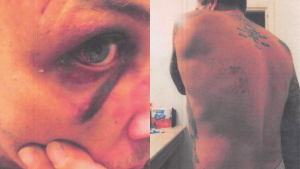A new lawsuit has been brought forward against a former Rankin County deputy who was directly involved in the “Goon Squad” police brutality ring.
On Tuesday, attorneys representing Christopher Mack went to federal court to pursue litigation against eight individuals on allegations that excessive force had been used against Mack while he was detained in Rankin County back in 2021. One of the officers listed in the lawsuit was “Goon Squad” member Brett McAlpin. Others listed were jail employee Ricky Davis, Deputy Chamblee (no first name was listed), and six unidentified deputies or trustees.
RELATED: Federal sentences handed down to ‘Goon Squad’ members
According to the lawsuit, Mack was arrested by Pearl police and transported to the Rankin County jail for booking. McAlpin and Davis called Mack back for interrogation. The two then began asking the subject about his knowledge of drugs and gangs. Mack claims to have maintained his silence and was allegedly struck in the back of the head by Chamblee who used a “heavy set of jail keys.”
McAlpin and Davis are said to have joined in on the beating of Mack. The lawsuit also states that Mack was dragged into a pod in the jail and was beaten by the six unidentified defendants for 45 minutes.
Mack was beaten so badly that he began throwing up blood and had to be sent to a local hospital with broken ribs, a broken nose, and multiple bruises, the lawsuit asserts. Once released from medical care, Mack was allegedly approached by Sheriff Bryan Bailey. The sheriff asked Mack who had beaten him. Upon hearing the man’s answer, Bailey allegedly responded, “F—!” and walked off.

Attorneys representing Mack assert that the subject had his eighth and 14th constitutional rights violated by the alleged abuse. The litigation also blames Bailey and Rankin County officials for enabling the alleged beating of Mack.
“Rankin County, Mississippi, acting by and through its Board of Supervisors and Sheriff Bryan Bailey and/or other policymakers, made a deliberate and/or conscious decision to disregard the known risk of harm that would result from the Sheriff’s Department’s unconstitutional patterns and practices and was deliberately indifferent and/or tacitly authorized the same,” the lawsuit reads.








